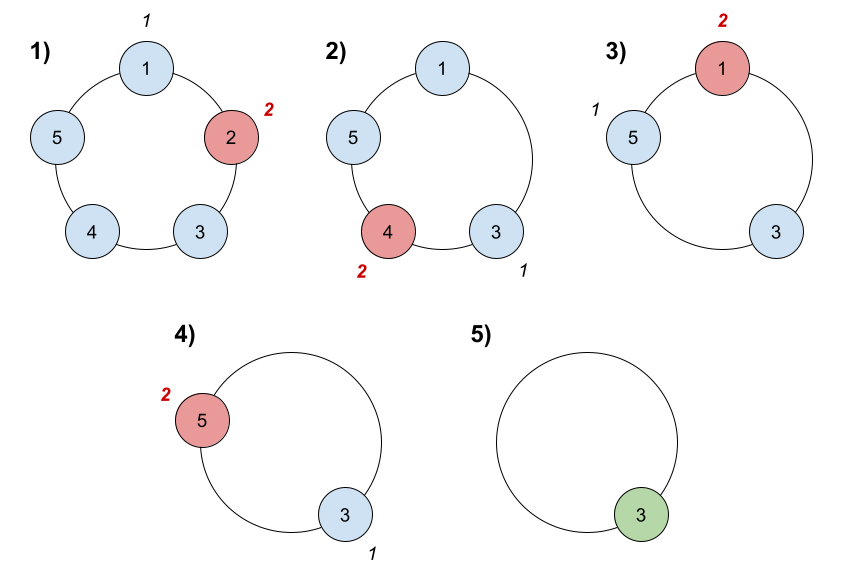Welcome to Subscribe On Youtube
1823. Find the Winner of the Circular Game
Description
There are n friends that are playing a game. The friends are sitting in a circle and are numbered from 1 to n in clockwise order. More formally, moving clockwise from the ith friend brings you to the (i+1)th friend for 1 <= i < n, and moving clockwise from the nth friend brings you to the 1st friend.
The rules of the game are as follows:
- Start at the
1stfriend. - Count the next
kfriends in the clockwise direction including the friend you started at. The counting wraps around the circle and may count some friends more than once. - The last friend you counted leaves the circle and loses the game.
- If there is still more than one friend in the circle, go back to step
2starting from the friend immediately clockwise of the friend who just lost and repeat. - Else, the last friend in the circle wins the game.
Given the number of friends, n, and an integer k, return the winner of the game.
Example 1:

Input: n = 5, k = 2 Output: 3 Explanation: Here are the steps of the game: 1) Start at friend 1. 2) Count 2 friends clockwise, which are friends 1 and 2. 3) Friend 2 leaves the circle. Next start is friend 3. 4) Count 2 friends clockwise, which are friends 3 and 4. 5) Friend 4 leaves the circle. Next start is friend 5. 6) Count 2 friends clockwise, which are friends 5 and 1. 7) Friend 1 leaves the circle. Next start is friend 3. 8) Count 2 friends clockwise, which are friends 3 and 5. 9) Friend 5 leaves the circle. Only friend 3 is left, so they are the winner.
Example 2:
Input: n = 6, k = 5 Output: 1 Explanation: The friends leave in this order: 5, 4, 6, 2, 3. The winner is friend 1.
Constraints:
1 <= k <= n <= 500
Follow up:
Could you solve this problem in linear time with constant space?
Solutions
-
class Solution { public int findTheWinner(int n, int k) { if (n == 1) { return 1; } int ans = (findTheWinner(n - 1, k) + k) % n; return ans == 0 ? n : ans; } } -
class Solution { public: int findTheWinner(int n, int k) { if (n == 1) return 1; int ans = (findTheWinner(n - 1, k) + k) % n; return ans == 0 ? n : ans; } }; -
class Solution: def findTheWinner(self, n: int, k: int) -> int: if n == 1: return 1 ans = (k + self.findTheWinner(n - 1, k)) % n return n if ans == 0 else ans -
func findTheWinner(n int, k int) int { if n == 1 { return 1 } ans := (findTheWinner(n-1, k) + k) % n if ans == 0 { return n } return ans } -
class LinkNode { public val: number; public next: LinkNode; constructor(val: number = 0, next?: LinkNode) { this.val = val; this.next = next; } } function findTheWinner(n: number, k: number): number { if (k === 1) { return n; } const dummy = new LinkNode(0); let cur = dummy; for (let i = 1; i <= n; i++) { cur.next = new LinkNode(i); cur = cur.next; } cur.next = dummy.next; cur = dummy; let count = 0; while (cur.next != cur) { count++; if (count === k) { cur.next = cur.next.next; count = 0; } else { cur = cur.next; } } return cur.val; } -
/** * @param {number} n * @param {number} k * @return {number} */ var findTheWinner = function (n, k) { if (n === 1) { return 1; } const ans = (k + findTheWinner(n - 1, k)) % n; return ans ? ans : n; }; -
impl Solution { pub fn find_the_winner(n: i32, k: i32) -> i32 { if n == 1 { return 1; } let mut ans = (k + Solution::find_the_winner(n - 1, k)) % n; return if ans == 0 { n } else { ans }; } }